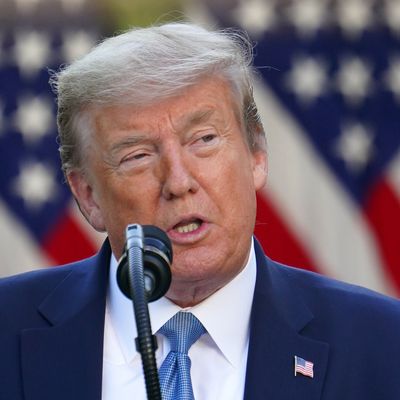
We’re committed to keeping our readers informed.
We’ve removed our paywall from essential coronavirus news stories. Become a subscriber to support our journalists. Subscribe now.
The origin story of the president’s Opening Our Country Council does not foretell success for the group. Last Friday, Trump announced that on April 14 he would debut a team full of “doctors and business people” to advise him in his rush to defibrillate the economy. Despite the five-day head start to assemble the team, the White House skipped a few recruiting basics for the group — like actually contacting council members to inform them of their membership, or sticking with the same name.
“We got a note about a conference call, like you’d get an invite to a Zoom thing, a few lines in an email, and that was it,” a D.C. lobbyist told the Washington Post. “Then our CEO heard his name in the Rose Garden? What the [expletive]? My company is furious. How do you go from ‘Join us on a call’ to, ‘Well, you’re on our team?’” A tumultuous White House prone to bungling basic tasks — led by an executive who equates saying something with achieving it — may have something to do with it.
According to the New York Times, several other companies involved were informed of their involvement in real time:
Cisco Systems, the networking company, and McDonald’s were among the major employers that learned of their involvement in consulting with the president only when he mentioned their names on Tuesday evening, according to people familiar with the matter.
Pfizer was also blindsided by its inclusion in the group, receiving a heads-up that Mr. Trump might mention the company an hour before the announcement, with no information about how many other companies were involved or what the purpose of the group was.
Richard Trumka, the president of the A.F.L.-C.I.O., was also not asked whether he would join the group before his name was announced by Mr. Trump as a participant, according to Carolyn Bobb, the union’s national media manager. But she said Mr. Trumka had planned to join a call with Mr. Trump on Wednesday “to see if it’s a serious effort.”
Even the name of the advisory group was lost in the mix. Last week, Trump referred to it as the “Opening Our Country Council,” but on Tuesday, it was billed in a White House press release as a collection of “Great American Economic Revival Industry Groups.” The release, which listed the business leaders involved, also misspelled the name of Lockheed Martin CEO Marillyn Hewson.
By Wednesday, according to the New York Times, lawmakers were receiving emails to join a different task force with the same goals. Similar to the business group, the White House “did not so much invite the lawmakers to participate as inform them of their selection.” In the email, the Trump administration did not define the congressional group’s purpose.
On Wednesday, Trump also spoke via a conference call with the business leaders he announced in the press release on Tuesday — which included Jamie Dimon of JPMorgan Chase, Tim Cook of Apple, Teamsters president Jim Hoffa, chef Jean-Georges Vongerichten, and casino magnate and GOP super-donor Sheldon Adelson. But the call was reportedly set up with little advance notice, so that some of the involved CEOs, like David Solomon at Goldman Sachs, were busy. Trump began the talk saying that “testing is under control,” despite the end of federal funding for coronavirus testing last Friday. According to the Times, those on the call repeated that more testing was needed before the economy could be reopened. Like Trump — whose desire to open the economy is based in his electoral self-interest — many of the executives were looking out for themselves, expressing valid concerns about their liability if their workers return and get sick.
You don’t need to go back far to find incompetence and miscommunication of the same variety: On March 13, Trump announced that Google would build a site to help Americans access coronavirus testing, to the surprise of Google. But if the administration hopes to counteract the expected 3 percent global economic dip in 2020, White House officials may need to master the details of email before they take on the delicate interstitching of the current economic and public health crises.






























